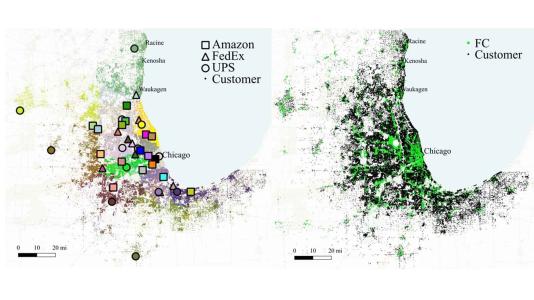2023-03-01 カリフォルニア大学サンタバーバラ校(UCSB)
触覚ホログラフィは、超音波の位相アレイを使用して、物理的な装置やインターフェースなしに空中に仮想的な三次元オブジェクトを触り、感じ、操作することができる。しかしながら、現在の触覚ホログラフィのタッチ感は、弱く漂白された風や空気の吹き出しに感じられる。
研究チームは、肌の中で振動を起こす超音波によってせん断衝撃波が発生することを発見し、これが空気中での超音波によるホログラフィで感じられるタッチ感の不明瞭さにつながっていることを明らかにした。今後は、この新たな現象を利用して、よりリアルで没入感のある仮想現実を実現するための触覚ホログラフィの改良が期待されている。
<関連情報>
- https://www.news.ucsb.edu/2023/020859/future-touch
- https://www.science.org/doi/10.1126/sciadv.adf2037
集束超音波によるハプティックホログラフィーを媒介するせん断衝撃波 Shear shock waves mediate haptic holography via focused ultrasound
Gregory Reardon,Bharat Dandu,Yitian Shao,Yon Visell
Science Advances Published:1 Mar 2023
DOI:https://doi.org/10.1126/sciadv.adf2037

Abstract
Emerging holographic haptic interfaces focus ultrasound in air to enable their users to touch, feel, and manipulate three-dimensional virtual objects. However, current holographic haptic systems furnish tactile sensations that are diffuse and faint, with apparent spatial resolutions that are far coarser than would be theoretically predicted from acoustic focusing. Here, we show how the effective spatial resolution and dynamic range of holographic haptic displays are determined by ultrasound-driven elastic wave transport in soft tissues. Using time-resolved optical imaging and numerical simulations, we show that ultrasound-based holographic displays excite shear shock wave patterns in the skin. The spatial dimensions of these wave patterns can exceed nominal focal dimensions by more than an order of magnitude. Analyses of data from behavioral and vibrometry experiments indicate that shock formation diminishes perceptual acuity. For holographic haptic displays to attain their potential, techniques for circumventing shock wave artifacts, or for exploiting these phenomena, are needed.



